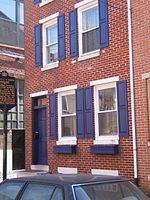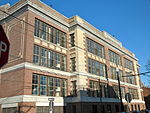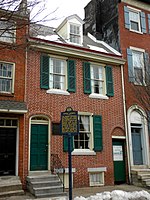Standard Theatre (Philadelphia)
1888 establishments in Pennsylvania1954 disestablishments in PennsylvaniaAfrican-American theatreBuildings and structures demolished in 1957Jazz clubs in Philadelphia ... and 4 more
South PhiladelphiaTheatres completed in 1888Theatres in PhiladelphiaVaudeville theaters

The Standard Theatre showcased Philadelphia's most talented African-American performers and jazz musicians in the early twentieth century. During its peak years (1915–1930), the Standard was one of Philadelphia's most famous and successful black theaters. Its exceptional success can be attributed to its owner, John T. Gibson, an African-American man who envisioned affordable entertainment for people of color.
Excerpt from the Wikipedia article Standard Theatre (Philadelphia) (License: CC BY-SA 3.0, Authors, Images).Standard Theatre (Philadelphia)
South Street, Philadelphia South Philadelphia
Geographical coordinates (GPS) Address Nearby Places Show on map
Geographical coordinates (GPS)
| Latitude | Longitude |
|---|---|
| N 39.943 ° | E -75.1608 ° |
Address
South Street 1116
19146 Philadelphia, South Philadelphia
Pennsylvania, United States
Open on Google Maps










